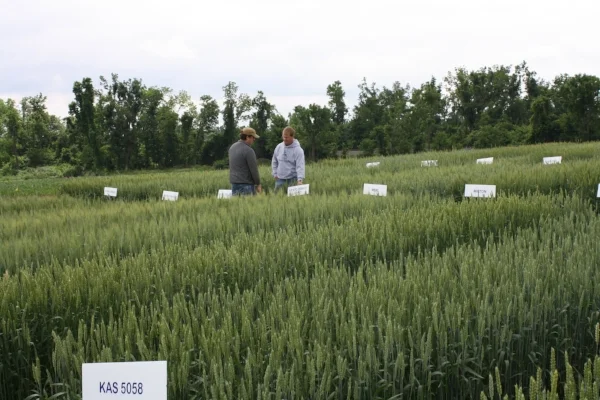The U.S. Department of Agriculture’s National Agricultural Statistics Service (NASS) released its Small Grains Summary Report today from the Small Grains Production Survey conducted earlier this month.
Read MoreWith thinking about wheat planting has come the usual, and less usual, questions about fall soil fertility. This article is prompted by recent questions about one of the less usual topics, in-furrow starter fertilizer for wheat. What, how, why/when and why/when not? Photo from K-State.
Read MoreItalian or annual ryegrass (Lolium perenne L. ssp. multiflorum ) has been a major weed issue for Kentucky wheat growers for many years. The introduction of ALS-inhibiting herbicides that had selectivity on ryegrass brought about a great tool for con-trolling ryegrass in wheat post-emergence.
Read MoreOne of the most critical management decisions Kentucky wheat producers must make in late summer/early fall is choosing which wheat varieties to grow. Even though Kentucky’s climate is extremely variable from year to year, there are several must have traits: yield and test weight are always at the top of the list, but disease and lodging resistance are essential as well.
Read MoreThe U.S. Department of Agriculture’s National Agricultural Statistics Service (NASS) is surveying Kentucky producers for its County Agricultural Production Survey (CAPS) small grains survey. The survey will collect information on total acres planted and harvested, and yield and production of small grains crops. CAPS will provide the data needed to estimate acreage and production of winter wheat in Kentucky.
Read MoreThe University of Kentucky Small Grain Variety Testing Program evaluates wheat and barley varieties that are commercially available or may soon be available to farmers. Annual variety performance testing provide farmers, seed producers, extension agents and consultants with current, unbiased information to help them select the varieties best adapted to their locality and individual requirements.
Read MoreChristian County is the leading wheat producing county in Kentucky for 2017, with production totaling 4,222,000 bushels, harvested from 53,000 acres. Wayne County had the highest average yield.
Read MoreThe University of Kentucky Small Grain Variety Testing Program evaluates wheat and barley varieties that are commercially available or may soon be available to farmers. Annual variety performance testing provide farmers, seed producers, extension agents and consultants with current, unbiased information to help them select the varieties best adapted to their locality and individual requirements.
Read MoreThe top five counties, which account for 52 percent of Kentucky’s wheat production, include: Christian County, Logan County, Todd County, Simpson County, and Graves County.
Read More








